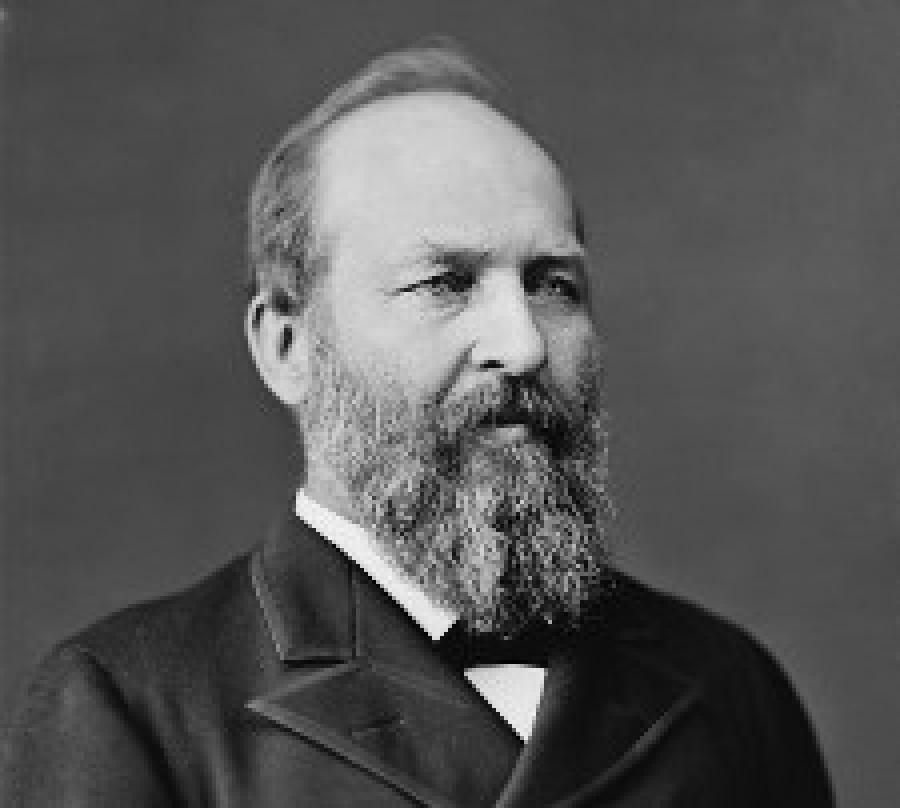Speech of Gen. James A. Garfield Delivered to the “Boys in Blue”
Image

A campaign speech by General James Garfield, who became the 20th President of the United States a few months later. Library of Congress, Rare Book and Special Collections Division, Printed Ephemera Collection.
New York, August 6, 1880
Comrades of the “Boys in Blue” and Fellow-Citizens of New York: I cannot look upon this great assemblage and these old veterans that have marched past us, and listen to the words of welcome from our comrade who has just spoken, without remembering how great a thing it is to live in this Union and be a part of it. [Applause.]
This is New York; and yonder, toward the Battery, more than a hundred years ago, a young student of Columbia College was arguing the ideas of the American Revolution and American union against the un-American loyalty to monarchy, of his college president and professors. By and by, he went into the patriot army, was placed on the staff of Washington, [cheers,] to fight the battles of his country, [cheers,] and while in camp, before he was twenty-one years old, upon a drum-head he wrote a letter which contained every germ of the Constitution of the United States. [Applause.] That student, soldier, statesman, and great leader of thought, Alexander Hamilton, of New York, made this Republic glorious by his thinking, and left his lasting impress upon this the foremost State of the Union. [Applause.] And here on this island, the scene of his early triumphs, we gather to-night, soldiers of the new war, representing the same ideas of union, having added strength and glory to the monument reared by the heroes of the Revolution.
Gentlemen, ideas outlive men; ideas outlive all earthly things. You who fought in the war for the Union fought for immortal ideas, and by their might you crowned the war with victory. [Great applause.] But victory was worth nothing except for the truths that were under it, in it, and above it. We meet to-night as comrades to stand guard around the sacred truths for which we fought. [Loud and prolonged cheers.] And while we have life to meet and grasp the hand of a comrade, we will stand by the great truths of the war. [“Good,” “good,” and loud cheers.] Many convictions have sunk so deep into our hearts that we can never forget them. Think of the elevating spirit of the war itself. We gathered the boys from all our farms and shops and stores and schools and homes, from all over the Republic. They went forth unknown to fame, but returned enrolled on the roster of immortal heroes. [Great applause.] They went in the spirit of the soldiers of Henry at Agincourt, of whom he said:
“For he to-day that sheds his blood with me, Shall be my brother; be he ne’er so vile, This day shall gentle his condition.”
And it did gentle the condition and elevate the heart of every worthy soldier who fought for the Union, [applause,] and he shall be our brother forevermore. Another thing we will remember: we will remember our allies who fought with us. Soon after the great struggle began, we looked behind the army of white rebels, and saw 4,000,000 of black people condemned to toil as slaves for our enemies; and we found that the hearts of these 4,000,000 were God-inspired with the spirit of liberty, and that they were all our friends. [Applause.] We have seen white men betray the flag and fight to kill the Union; but in all that long, dreary war we never saw a traitor in a black skin. [Great cheers.] Our comrades escaping from the starvation of prison, fleeing to our lines by the light of the North star, never feared to enter the black man’s cabin and ask for bread. [“Good, good,” “That’s so,” and loud cheers.] In all that period of suffering and danger, no Union soldier was ever betrayed by a black man or woman. [Applause.] And now that we have made them free, so long as we live we will stand by these black allies. [Renewed applause.] We will stand by them until the sun of liberty, fixed in the firmament of our Constitution, shall shine with equal ray upon every man, black or white, throughout the Union. [Cheers.] Fellow-citizens, fellow-soldiers, in this there is the beneficence of eternal justice, and by it we will stand forever. [Great applause.] A poet has said that in individual life we rise “On stepping-stones of our dead selves to higher things,” and the Republic rises on the glorious achievements of its dead and living heroes to a higher and nobler national life. [Applause.] We must stand guard over our past as soldiers, and over our country as the common heritage of all. [Applause.]
I thank you, fellow-citizens, for this magnificent demonstration. In so far as I represent in my heart and life the great doctrines for which you fought, I accept this demonstration as a tribute to my representative character. [Applause.] In the strength of your hands, in the fervor of your hearts, in the firmness of your faith, in all that betokens greatness of manhood and nobleness of character, the Republic finds its security and glory. [Applause.] I do not enter upon controverted questions. The time, the place, the situation forbid it. I respect the traditions that require me to speak only of those themes which elevate us all. Again I thank you for the kindness and enthusiasm of your greeting. [Tremendous cheering.]
- 31 views

Discussion